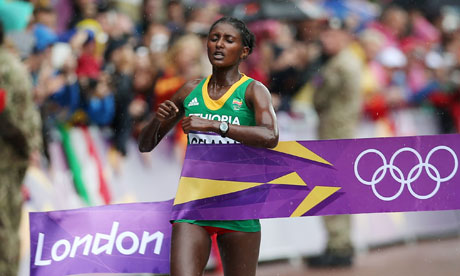Ethiopian inquiry after world championship race underlines the money versus prestige and pride factor in athletics

Tiki Gelana, who failed to finish the world championship marathon in Moscow, won the event at London 2012. Photograph: Graeme Robertson
There was shock on Saturday 10 August when Tiki Gelana, the Olympic champion from Ethiopia, pulled out of the women's marathon at the world championships after little more than 10km. On the BBC commentary, Brendan, Crammie and Paula speculated that the mid-afternoon heat must have been a factor: it was 30C and oppressively humid as they ran up and down a road beside the airless Moscow River. Crammie wondered if Gelana had fully recovered from her fall at the London marathon, where she was dramatically blindsided by the Canadian wheelchair athlete Josh Cassidy.
However, an alternative theory emerged from the Ethiopian AthleticsFederation. Disappointed with their runners – one out of five finished, and she came 13th – the EAF asked Gelana and Meseret Hailu, the world half-marathon champion, for written explanations of why they pulled out. The implication was that they were saving themselves for big-city marathons, where they could be paid up to £60,000 rather than competing for a lump of metal and a bouquet of flowers. The pair are not allowed to race again until they respond.
It is not the first time that such a suggestion has been made about African distance runners, although usually it is whispered rather than blurted out by the national federation. Since the late 1980s, Kenyan men have won around three-quarters of the world's most famous city marathons. Yet, during that period the country has produced one Olympic gold medallist in the event: Sammy Wanjiru in Beijing.
It is not hard to understand why some East African athletes, many of whom will have grown up in profound poverty, might struggle to embrace the Olympic ideal of competing for free. A world-class marathoner may not want to race more than twice a year and peak years can pass in the click of your fingers.
Given the physical demands of the sport, marathon runners would be crazy if they were not pragmatic. One thinks of the American Alberto Salazar (now coach of Mo Farah) – utterly dominant in the early 80s until, one day, he wasn't. The turning point was the 1982 Boston marathon – his so-called "Duel in the Sun" against Dick Beardsley – where the heat was nothing like as brutal as in the Moscow race (it was an April morning, scarcely topping 20C). Still, Salazar went to hospital after winning, had six litres of fluid pumped into his body intravenously and could barely run faster than a jog for years afterwards. Not all athletes compete at events such as the Olympics without reward; most countries offer bonuses to their medal winners.
In 2012, Georgia promised £800,000 for each gold; in the event there was one payout: Lasha Shavdatuashvili, a judoka. The United States had a sliding scale of $25,000 for gold, $15,000 for silver and $10,000 for each bronze. Interestingly, of all the countries that did offer a financial sweetener for a gold medal, the lowest – £6,500 – was Kenya. You could argue that this would be a life-changing amount in a country where the average annual salary is about £1,000. But for a successful marathon runner that figure is small change: he or she would earn more if they finished sixth in the 2013 Boston marathon. Also worth noting: for the world championships in Moscow, Ethiopia required all of its best marathoners to compete; Kenya, meanwhile, merely invited a dozen of their top athletes and they could choose to accept or not.
Two countries went on record saying they would not pay their Olympians in 2012: Great Britain and Argentina (see, guys, are we really so different?). The British Olympic Association noted that it did not believe their athletes needed financial motivation to give it their all. And statistically it is right: there seems to be almost no meaningful correlation between monetary payments and a country's eventual medal haul.
Emotionally, the BOA may have a point, too. Medals – especially Olympic golds – do have a value in the UK that defies any price tag. Take Mark Cavendish: the Manx Missile is on his way to becoming the most successful stage winner in the Tour de France and the greatest sprinter in the history of cycling but he has never won an Olympic medal and it clearly annoys the hell out of him.
How to explain that? Well, the single‑minded pursuit of money has always been deemed vulgar in Britain. The class system has brainwashed us that privilege cannot simply be bought; it has also created a widespread disdain for anything nouveau riche. It makes perfect sense that Britain might embrace an arcane athletic competition that accentuates personal glory and national prestige over financial rewards – and, equally, that some competitors from other countries may find that attitude baffling.
All of which makes the recurring Olympic disappointments of Paula Radcliffe even more poignant. To look merely at results, Radcliffe's career would seem like a quintessential example of a marathon runner who saved her best performances for the most profitable races. She holds the world record and has run the three fastest times in women's marathon history. She emphatically won three marathons each in London and New York, big paydays all.
The heart-breaking kicker is that she had a horrible run of luck in the Olympic marathon: a leg injury in 2004, a stress fracture before 2008 and a foot problem before London. Watching her distress as another opportunity passed, one could not help but wonder whether she would have swapped all her other achievements for one Olympic gold over 26.2 miles.
Tim Lewis's book on Rwanda's cycling team, Land of Second Chances, is available from the Guardian Bookshop at the special price of £13.59